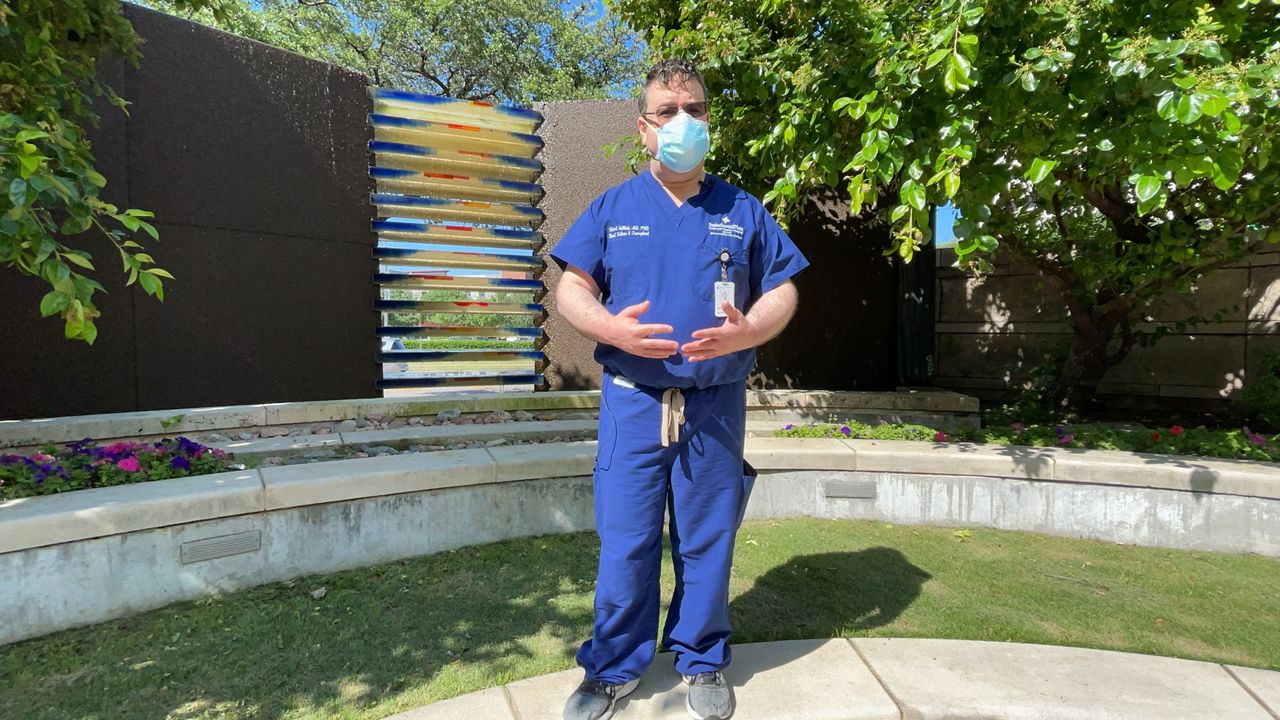DALLAS — It’s been proven that monoclonal antibodies reduce hospitalizations among patients at high risk for COVID-19 complications. With several new variants identified, researchers at Baylor University Medical Center Research Institute are hopeful a clinical trial with a new antibody drug will prove to be effective against all variants of concern.
The antibody, LY-CoV1404, was developed by Eli Lilly and AbCellera and is currently in clinical trials in patients with mild to moderate COVID-19. The antibody is being evaluated alone and together with other monoclonal antibodies. These antibodies mimic the natural antibodies produced by COVID-19, then ultimately prevent the particles from infecting our cells even further.
The new antibody binds to a rarely mutated region of the SARS-CoV-2 spike protein and neutralizes all currently known variants of concern, including those first identified in the UK (B.1.1.7), South Africa (B.1.351), Brazil (P.1), California (B.1.426 and B.1.429) and New York (B.1.526), an AbCellera news release reports.
"New variant-resistant treatments such as LY-CoV1404 are desperately needed, given that some of the existing therapeutic antibodies are less effective or ineffective against certain variants and the impact of variants on vaccine efficacy is still poorly understood,” the research team wrote.
Dr. Robert Gottlieb, the lead investigator at Baylor Scott and White Research Institute, says this newest clinical trial Baylor is participating in may open the possibility of giving the treatment via an injection instead of through an IV, which would hopefully mean it would become more widely accessible in the future. This is because LY-CoV1404 is highly potent and may be able to be given at lower doses.

"And that's important because while you might be able to go to an emergency room or someplace else that can get an IV,” Gottlieb said. "Imagine if you could just go to your doctor or healthcare provider’s clinic, and just receive an injection or even maybe pick it up one day from your local pharmacy."
Gottlieb said while previous antibody-based therapies have been proven to be successful against COVID-19, researchers are trying to get ahead of the virus studying therapies that continue to work regardless of new, emerging variants. The current monoclonal antibody therapies are available to older patients that aren’t hospitalized, but at high risk for disease progression.
“The virus continues to adapt to us, the virus continues to evolve. And so we need to continue to adapt to the virus. And there remains a possibility that the antibodies that we have one day may not be as efficacious in the future if the virus continues to accumulate mutations,” Dr. Gottlieb said. "We're lucky that remdesivir works if someone's in the hospital. But wouldn't it be great if you could treat it earlier? Well, this monoclonal therapy is the way to treat earlier."
During a clinical trial in February, Lampasas resident Sandra Bobo received monoclonal antibodies at Baylor University Medical Center. Sandra wanted to be a part of history, helping the hospital research the effectiveness of antibody therapy on preventing hospitalizations in those at high risk for disease progression.
“My hope is that I can help in some way with the research of this awful virus. And, you know, somehow make a difference where it can help people in the long run,” Bobo said.
Bobo described her COVID-19 infection as “not so bad,” but knows others may have a harder time with it.
“My boyfriend is terribly sick and I have mild symptoms. So I think it just depends on where the virus lands and how it affects people. It's so different from person to person,” Bobo said.
Bobo was hooked up to an IV to receive the antibodies, but the process typically takes an hour during a slow drip. Dr. Gottlieb is hopeful for this new trial that may allow for shots instead of the IVs. He said he is thankful patients like Bobo donate their time to work toward a future of promising COVID-19 treatments.
“Think back to a year ago, it's very daunting when we didn't have any therapies. But to remain engaged and part of the solution is really empowering, and really keeps me going,” Dr. Gottlieb said. "As a transplant cardiologist, we're used to spending very intense amounts of resources and time on an individual patient. And that is very rewarding and fulfilling to see the person whose life you're helping. At the same time, COVID has been an opportunity to be able to help more patients throughout the world. And while it's gratifying to be able to treat a disease and help the patient get better, getting to the point of treating a disease earlier and getting to the prevention mode or early intervention mode, you can actually treat many more people, help many more lives much more efficiently. And that has been a very unique aspect to this."
To see if you’re eligible to be screened for the clinical trials of the new antibody, send an email to pyah@bswhealth.org.



